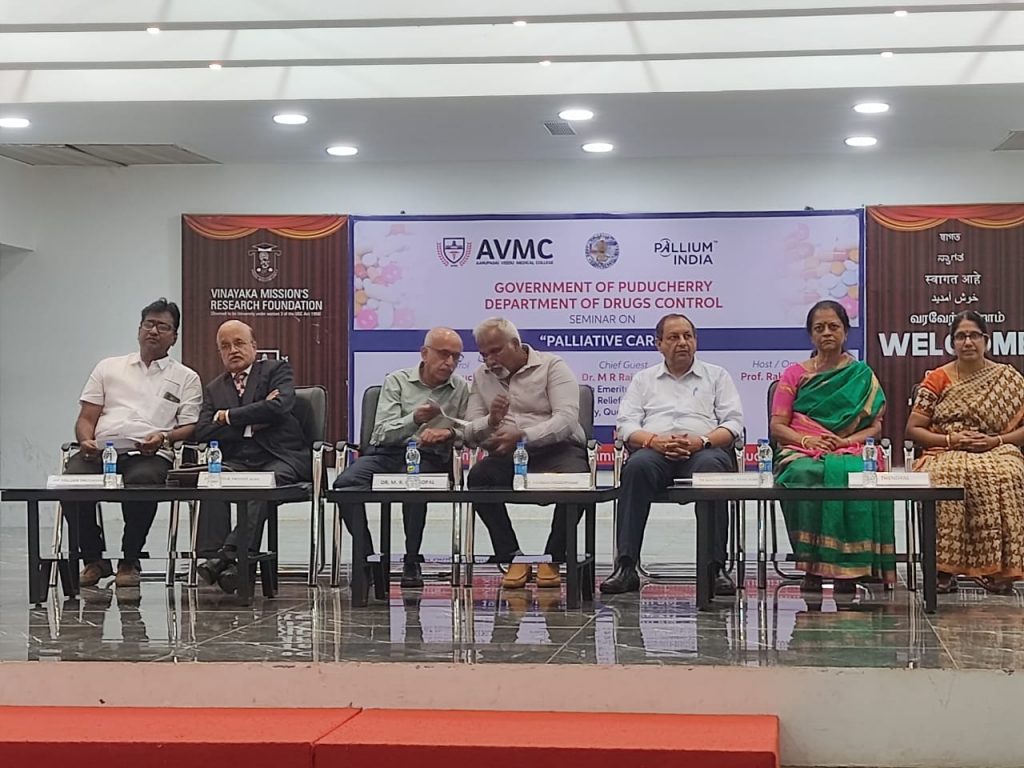Something special about opioid access workshop in Puducherry!

Over the last one year, Pallium India has conducted 14 opioid access workshops in 17 states and Union Territories.
But there was something special about the one conducted in Aarupadai Veedu Medical College (AVMC), Puducherry on 19 March 2024. For the first time in history, such a workshop happened because of the initiative of the Drug control authority.
Dr Anandakirouchanane (Controlling Authority, Drug Administration, Puducherry) took the initiative to get the audience in, including doctors, pharmacists, drug regulators and medical students from various institutions in the city. We gratefully remember his words from the last meeting that we conducted in Puducherry, “My job title maybe ‘drug controller’; but will act more as a drug facilitator.”
The meeting discussed all aspects of opioid access for pain relief; particularly emphasising the principle of balance – the duty of healthcare providers and drug regulators to ensure a balance between opioid access for pain relief and prevention of inappropriate or non-medical use.
We are particularly grateful to Dr P F Kotur (Provost, AVMC) and to AVMC for hosting the meeting. We also thank Dr Mallika Tiruvadanan (Managing Trustee, Lakshmi Pain & Palliative Care Trust) and Dr Thendral (Dept of Anesthesia and Pain & Palliative care – Cancer Institute (WIA), Chennai) for being valuable faculty for the program.
The event was also graced by Dr. Rakesh Sehgal (Dean, AVMC) and Dr. Arunachalam ( MD-Community medicine, Prof. HOD DMS) and Dr. M R Rajagopal (Chairman Emeritus, Pallium India).
Dr. Rakesh Sehgal commenced proceedings by welcoming the guests and emphasizing the workshop’s significance, particularly noting Dr. Rajagopal’s profound contributions to palliative care in India. Stressing the importance of interactive sessions for effective learning, he encouraged participants to actively engage throughout the day.
This was followed by Dr. E. Anandakirouchenane, who highlighted the Drug Administration’s commitment to ensuring the seamless availability of opioids to organizations. He underscored the importance of adhering to due processes to facilitate effective pain relief for patients, emphasizing the pivotal role of opioids in palliative care.
Dr. Mallika Tiruvadanan offered a comprehensive introduction to palliative care, employing case-based scenarios to illustrate key concepts. Drawing parallels with famous movie lines, she underscored the importance of providing palliative care with skill and compassion, invoking examples from popular culture to emphasize the significance of the practice.
Following a tea break, Dr. Rajagopal led a session on Opioids Availability, providing insights into the crucial role of opioids in palliative care. He delved into the NDPS rules of 1985 and the subsequent amendments in 2014, elucidating the challenges faced by organizations and administrations in navigating these regulations. Dr. Rajagopal simplified the complexities of the amendments, facilitating a discussion on administrative hurdles and underscoring the role of pharmacists in ensuring compliance with SOPs for the smooth functioning of palliative care teams.
Dr. R. Thendral’s session on end-of-life care and Advance Care Planning (ACP), highlighted the importance of ACP directives within the context of Indian healthcare. She emphasized that ACP is a process that allows individuals to articulate their preferences regarding medical treatment and care, particularly towards the end of life, ensuring that their wishes are respected even if they become unable to communicate them directly.
Furthermore, Dr. Thendral underscored the role of healthcare providers in facilitating ACP discussions with patients and their families, emphasizing the need for open communication and sensitivity to cultural and religious beliefs. She encouraged participants to integrate ACP discussions into routine clinical practice, thereby promoting patient-centered care and ensuring that individuals receive care aligned with their values and preferences, particularly towards the end of life.
Dr. Mallika concluded the workshop with an interactive session on “Medical Ethics,” where she delved into the four cardinal principles governing ethical medical practice. These principles include the right to refuse or accept treatment, the right to be involved in decision-making processes, and the importance of honoring patient wishes. Through engaging discussions, Dr. Mallika addressed the ethical dilemmas commonly encountered by stakeholders in the context of advanced diseases, stressing the significance of beneficence, non-maleficence, and justice as guiding principles.
The workshop concluded with overwhelmingly positive feedback, highlighting the value of such platforms in facilitating learning and fostering interactive discussions and debates among stakeholders involved in palliative care. Such workshops play a vital role in enhancing understanding, collaboration, and ultimately improving the quality of care provided to patients with life-limiting illnesses.






